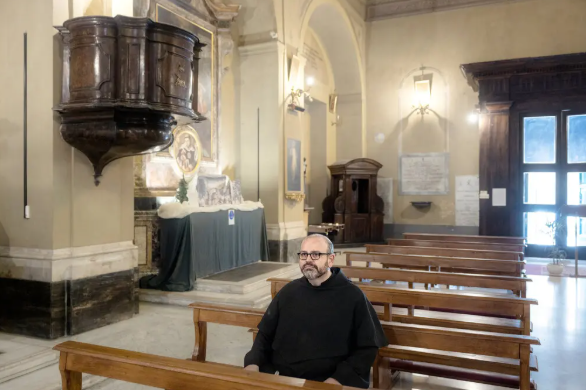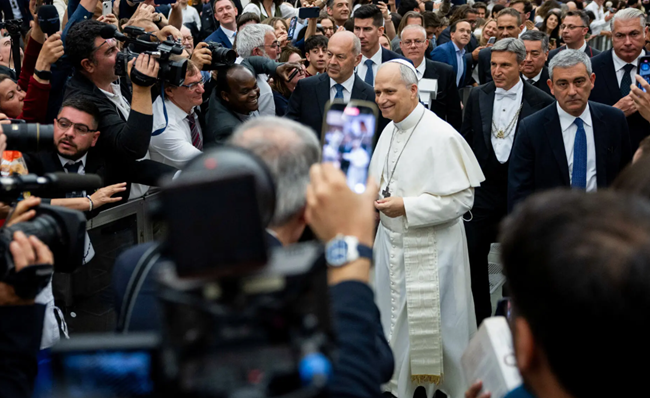Why Pope Leo XIV Fears Artificial Intelligence

Learn how the Catholic Church, under Pope Leo XIV's leadership, is positioning itself as a moral and ethical voice in the global conversation about artificial intelligence. Supporting links 1. Meet the Vatican’s AI mentor [POLITICO] 2. Pope Leo XIV and A.I. [PBS News] 3. Pope Leo XIII – Biography & Facts [Pope History] 4. Pope Leo XIII & the Meaning Behind the Name [Spiritual Wanderlust] 5. ...
Learn how the Catholic Church, under Pope Leo XIV's leadership, is positioning itself as a moral and ethical voice in the global conversation about artificial intelligence.
Supporting links
1. Meet the Vatican’s AI mentor [POLITICO]
2. Pope Leo XIV and A.I. [PBS News]
3. Pope Leo XIII – Biography & Facts [Pope History]
4. Pope Leo XIII & the Meaning Behind the Name [Spiritual Wanderlust]
5. New Vatican document examines potential and risks of AI [Vatican News]
6. What does the Vatican know about A.I.? A lot, actually. [America, the Jesuit Review]
Contact That's Life, I Swear
- Visit my website: https://www.thatslifeiswear.com
- Twitter at @RedPhantom
- Bluesky at @rickbarron.bsky.social
- Email us at https://www.thatslifeiswear.com/contact/
Episode Review
- Submit on Apple Podcast
- Submit on That's Life, I Swear website
Other topics?
- Do you have topics of interest you'd like to hear for future podcasts? Please email us
Interviews
- Contact me here https://www.thatslifeiswear.com/contact/, if you wish to be a guest for a interview on a topic of interest
Listen to podcast audios
- Apple https://apple.co/3MAFxhb
- Spotify https://spoti.fi/3xCzww4
- My Website: https://bit.ly/39CE9MB
Other
- Music ...
⏱️ 11 min read
What do the Vatican City and Silicon Valley have in common? According to Pope Leo XIV, more than you might think.
In a world racing toward artificial intelligence, the new leader of the Catholic Church has made one thing clear: humanity must be warned. We'll explore why A.I. has become a top priority for Pope Leo—and what his concern says about the future of faith, ethics, and technology.
INTRO: Welcome to That's Life, I Swear. This podcast is about life's happenings in this world that conjure up such words as intriguing, frightening, life-changing, inspiring, and more. I'm Rick Barron your host.
That said, here's the rest of this story
New Pope Takes Stand on AI: Leo XIV Voices Concerns Over Technology's Impact
A growing unease permeates Sunday gatherings in the quaint parish of St. Matthias Schöneberg in Berlin. Artificial intelligence has become an unexpected topic of concern among this diverse congregation of 12,000 Catholics from over 100 nations. Parents worry about their children encountering misinformation through AI chatbots, teachers vigilantly monitor for technology-assisted cheating, and parish interpreters fear technological obsolescence in their profession.
Once confined to tech forums and academic discussions, these worries have now found resonance in the Vatican's highest office. Less than a week after assuming the papacy, Pope Leo XIV has prominently positioned artificial intelligence among his primary concerns, signaling a pontificate attuned to one of the most transformative technologies of our time.
A Mathematician Pope Addresses a Digital Age
"Human dignity, justice, and labor" were central themes in Leo XIV's inaugural address to the College of Cardinals when discussing the risks posed by artificial intelligence. Later, addressing journalists, he acknowledged AI's "immense potential" while emphasizing the responsibility "to ensure that it can be used for the good of all."
This early focus reveals a pontiff who recognizes the gravity and complexity of AI's role in modern society. His background in mathematics provides him with technical insight often absent in religious leadership, allowing him to engage meaningfully with the subject.
Paolo Benanti, a Franciscan friar serving as the Vatican's top adviser on AI ethics, expressed surprise at the pope's "bold" prioritization. He recalled how his doctoral proposal to study cyborgs and human enhancement at the Gregorian pontifical university was met with skepticism from advisers just fifteen years prior.
Paolo Benanti in Rome. Courtesy of the New York Times
"And now it's the first topic of a pope," Benanti remarked during an interview at his monastery.
The pope's interest in digital technologies predates his election. As cardinal and head of the Vatican office managing bishops worldwide, the future pope invited Benanti to address Vatican department leaders about navigating digital life and artificial intelligence in September of 2024, who by the way obtained a B.S. degree in mathematics at Villanova University in 1977, demonstrating foresight about technology's growing influence on faith communities.
Building on Papal Precedent
Pope Leo XIV continues a tradition established by his predecessor, Pope Francis, who called for greater AI oversight and urged that technology be directed toward solving social problems rather than serving "the desire for profit and the thirst for power."
In selecting his papal name, Leo XIV drew inspiration from Pope Leo XIII, who addressed the disruptive forces of the industrial revolution in the late 19th century. In his landmark 1891 encyclical, Pope Leo XIII argued that governments must "save unfortunate working people from the cruelty of men of greed, who use human beings as mere instruments for money making," even as he acknowledged the "discoveries of science."
This historical parallel is striking—a pope named Leo once again faces a technological revolution transforming society, labor, and human relationships.
A Critical Moment for Technology Governance
The pope's advocacy comes at a pivotal moment in AI development. Companies are investing billions in accelerated development while global regulatory frameworks are in the early stages of growing. Nations like the United States view AI advancement as a geopolitical imperative, hesitating to impose restrictions that might benefit competitors like China.
Silicon Valley's fervent belief in AI's transformative potential mirrors religious conviction—many tech leaders view these tools as comparable to historical breakthroughs like the steam engine, electricity, and the internet. Proponents envision revolutionary advances in healthcare, scientific discovery, and economic growth.
However, AI's risks are equally significant: the proliferation of sophisticated misinformation, algorithmic control of critical systems, autonomous weapons beyond human oversight, and widespread workforce displacement.
The International Monetary Fund estimates AI will impact approximately 40 percent of global jobs—enhancing some while eliminating others. These labor market disruptions could widen wealth inequality, dividing society between those who profit from AI and those whose livelihoods it eliminates.
The Church's Historical Relationship with Technology
The Catholic Church has historically embraced technological progress. Medieval monks invented labor-saving devices like tidal-powered water wheels, and the Church supported Catholic inventors who created innovations, including the barometer and early calculating machines.
"But as the power of technology has become very, very large, the potential downsides have come into view," observed Brian Patrick Green, technology ethics director at Santa Clara University located in California.
Like other institutions, the Catholic Church and its 1.4 billion followers can leverage artificial intelligence to streamline administrative tasks, conduct research, and process large datasets. A growing market for religious AI applications includes services like Bible Chat, which answers common spiritual questions like "Is getting tattoos a sin?" for $59.99 annually, and Magisterium AI, which assists clergy with Mass readings and basic theological inquiries.
Catholic leaders recognize the need for discernment in applying these tools. Jose Manuel De Urquidi, founder of a digital marketing company serving Catholic organizations, noted that using AI to generate homilies without pastoral input would undermine ministry: "If you said, 'Please write a homily for this Sunday,' and they print it and then read it, of course that sucks."
For those who don’t know the meaning of Homily, it's a commentary that follows a reading of scripture, giving the "public explanation of a sacred doctrine" or text.
In his first speech to journalists, Pope Leo XIV cited the “immense potential” of A.I. while warning that it requires responsibility “to ensure that it can be used for the good of all.” Courtesy of the New York Times
A Voice for Ethical Restraint
Catholic ethicists believe the pope can serve as a moderating influence in AI development. "What we can do is convene people of good will," said Reverend Brendan McGuire, pastor of St. Simon Parish in Los Altos, California, who frequently consults with Silicon Valley technology leaders. "This is not a Catholic problem, this is a humanity problem."
Father Josef Wieneke, pastor at St. Matthias in Berlin, expressed relief at the pope's prompt attention to artificial intelligence, noting that even secular publishers have sought religious perspectives on AI ethics.
Following his namesake's example, Leo XIV may pressure governments and corporations to mitigate technology's negative impacts and protect vulnerable workers. However, whether he can successfully translate moral convictions into practical influence over multinational corporations or legislation remains uncertain.
Stephen N. Williams, emeritus professor of systematic theology at Union Theological College in Belfast, suggested the pope might "struggle to convert convictions into things that are really going to influence the big businesses and corporations" or shape legislation.
The Church's Pastoral Response
Matthew Harvey Sanders, founder of Magisterium AI, envisions the Church as a sanctuary for those adversely affected by technological change—those who lose jobs, become lost in virtual reality, or experience disappointment from AI relationships. He believes the pope's role isn't primarily to influence government policy but to offer spiritual guidance through technological disruption.
A 2012 interview with the future pope, then a cardinal, may offer insight into his approach to technological challenges. Discussing harm caused by popular culture and social media, he rejected withdrawal from media as a solution. Instead, he emphasized teaching "people to become critical thinkers" who understand that "not everything you hear or everything you read should be taken at face value."
This perspective suggests that Pope Leo XIV may focus on equipping Catholics with discernment skills rather than simply advocating technological restrictions—preparing the faithful to navigate an AI-saturated world while maintaining human dignity and spiritual values.
Balancing Innovation and Humanity
As Pope Leo XIV begins his pontificate, his early focus on artificial intelligence signals recognition that the Church must engage with, rather than retreat from, technological change. His mathematical background and apparent technological literacy position him uniquely among religious leaders to address these complex issues.
The challenges are formidable. AI development continues at breakneck speed, often outpacing ethical frameworks and regulatory efforts. The technology promises extraordinary benefits while threatening fundamental aspects of human experience—from work and creativity to truth and community.
In this rapidly evolving landscape, Pope Leo XIV seeks to articulate a distinctly Catholic perspective—one that embraces technological innovation while insisting it serve human flourishing and dignity. Whether addressing world leaders, technology executives, or his global congregation, the pope's message emphasizes that artificial intelligence, despite its power, must remain a tool guided by human wisdom and moral principles.
For the parishioners at St. Matthias Schöneberg and Catholics worldwide, the pope's engagement with artificial intelligence provides reassurance that their spiritual leader understands modern challenges. As they navigate an increasingly AI-influenced world, they now have a pontiff prepared to offer not just spiritual guidance but technological wisdom—a shepherd for the digital age. [1341 words]
What can we learn from this story? What's the takeaway?
The Catholic Church, under Pope Leo XIV's leadership, is positioning itself as a moral and ethical voice in the global conversation about artificial intelligence. It shows that even the oldest institutions must now confront the ethical, social, and spiritual implications of fast-moving technologies that are reshaping the world.
Well, there you go, my friends; that's life, I swear
For further information regarding the material covered in this episode, I invite you to visit my website, which you can find on Apple Podcasts for show notes and the episode transcript.
As always, I thank you for the privilege of you listening and your interest.
Be sure to subscribe here or wherever you get your podcast so you don't miss an episode.
See you soon.












